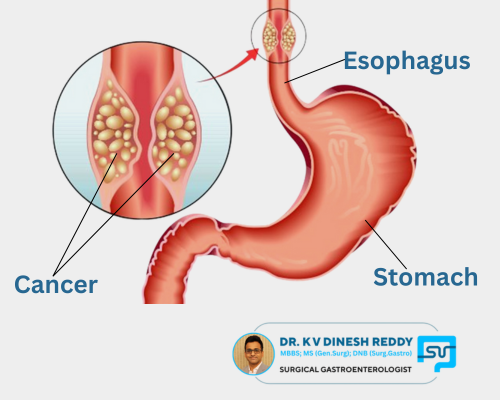Best Esophageal Cancer Treatment in Hyderabad
With years of experience in surgical gastroenterology and minimally invasive techniques, he focuses on treating the disease while supporting each patient’s comfort and recovery.
Whether you’ve just been diagnosed or want a second opinion, you’ll receive personal attention, clear guidance, and expert care every step of the way.

What is Esophageal Cancer?
Esophageal cancer is a disease where abnormal cells grow in the lining of the esophagus, it is the food pipe that connects your throat to your stomach. If this is not treated early, the cancer can spread to other parts of the body.
There are two main types of esophageal cancer:
- Adenocarcinoma: Usually found in the lower part of the esophagus
- Squamous cell carcinoma: Often affects the upper or middle part of the esophagus
Getting an early esophageal cancer diagnosis helps in choosing the right treatment and gives better chances of recovery.
Symptoms of Esophageal Cancer
- Difficulty swallowing (dysphagia)
- Chest pain or constant heartburn
- Chronic cough or voice changes
- Unexplained weight loss
- Frequent indigestion or acid reflux
Causes and Risk Factors
Esophageal cancer can develop due to several health and lifestyle factors. Knowing these risks can help with early prevention and timely screening.
Some common causes and risk factors include:
- Chronic acid reflux or Barrett’s esophagus
- Smoking and heavy alcohol consumption
- Being overweight or having an unhealthy diet
- Family history of esophageal or other cancers
- Ongoing irritation or damage to the esophagus
Understanding what increases the risk of esophageal cancer is important for early detection and better outcomes.
Diagnosis of Esophageal Cancer
To confirm esophageal cancer and understand how far it has progressed, several tests are used. Early and accurate diagnosis is the first step toward effective treatment.
Common diagnostic methods include:
- Upper GI Endoscopy – to view the inner lining of the esophagus
- Biopsy – to check if the tissue is cancerous
- Imaging Tests – such as CT scan, PET-CT, or endoscopic ultrasound (EUS) to check the stage and spread
- Blood Tests & Nutrition Assessment – to evaluate overall health and plan treatment
Getting the right esophageal cancer diagnosis early can lead to better treatment results and improved recovery.
Treatment Options for Esophageal Cancer
The treatment plan for esophageal cancer depends on the stage of the disease, your overall health, and where the tumor is located. Both surgery and non-surgical treatments are available.
Surgical Treatment
- Esophagectomy: This is the most common surgery for esophageal cancer. The surgeon removes the cancer-affected part of the esophagus and connects the remaining part to the stomach. It can be done through open surgery or with minimally invasive techniques for faster recovery and less pain.
Non-Surgical Treatments
- Chemotherapy: Uses anti-cancer drugs to kill or slow down cancer cells. It can be systemic (whole body) or regional (specific area).
- Radiotherapy: High-energy radiation is used to shrink or destroy cancer cells. It includes:
- External radiation therapy (outside the body)
- Internal radiation therapy (radiation placed near the tumor)
- Endoscopic Therapy: Minimally invasive methods like endoscopic mucosal resection and ablation are used to treat early-stage cancers or pre-cancerous lesions.
Doctors may use these treatments alone or in combination, based on individual needs.
Why Choose Dr. K V Dinesh Reddy?
- 10+ years of experience in Gastrointestinal Surgery and GI Oncology
- Skilled in esophagectomy and other complex esophageal cancer surgeries
- Special focus on laparoscopic and minimally invasive procedures for faster recovery
- Performed thousands of successful surgeries with excellent outcomes
- Known for providing clear guidance, care, and support throughout treatment
Take Control of Esophageal Cancer – Book Your Appointment Today
Esophageal cancer can be life-changing, but the right care can make a big difference. Get expert diagnosis and advanced treatment from Dr. K V Dinesh Reddy, one of the most trusted names for esophageal cancer treatment in Hyderabad. With compassionate care and proven experience, you can move forward with strength and confidence.
📞 Call: +91 9390836659 to book your consultation today.
